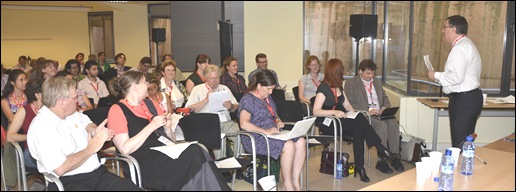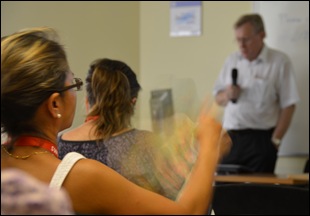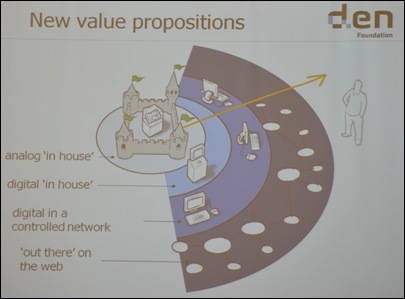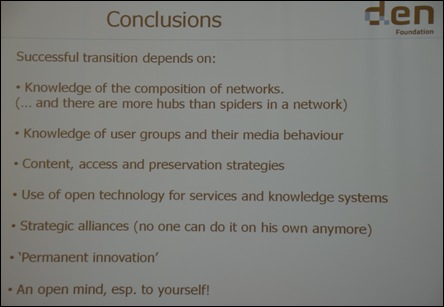 “Heritage collections in the digital future” was the revealing title of the first workshop I attended at the annual conference of LIBER, the Association of European Research Libraries, in Barcelona. The title was immediately attacked by Marco de Niet of Digital Heritage Netherlands: ‘Digital Future? Come on! The digital reality is today.’
“Heritage collections in the digital future” was the revealing title of the first workshop I attended at the annual conference of LIBER, the Association of European Research Libraries, in Barcelona. The title was immediately attacked by Marco de Niet of Digital Heritage Netherlands: ‘Digital Future? Come on! The digital reality is today.’
 Was it really necessary for De Niet to talk in terms of ‘Shame on you!’, I wondered when he started his presentation? Have we not reached the stage now where we all know about the digital present and are making plans for it even if we cannot act upon them immediately?
Was it really necessary for De Niet to talk in terms of ‘Shame on you!’, I wondered when he started his presentation? Have we not reached the stage now where we all know about the digital present and are making plans for it even if we cannot act upon them immediately?
Unfortunately, the answer must be no. Starting with Ivan Boserup’s summary of the findings of a recent poll amongst LIBER libraries, followed by statistics gathered by De Niet himself (from projects such as Enumerate), and on through Jackie Dooley’s summary of recent OCLC research (Taking Our Pulse: the OCLC Research Survey of Special Collections and Archives) – the evidence is overwhelming that (research) libraries are still pretty much functioning within an analogue paradigm. This is not to say that they are all still about lending physical books. Of course not, quite a few libraries have digitized collections and provide online access. But their digitization efforts mostly lack strategic planning, access is still mostly provided in a controlled way (for a limited group of users), preservation issues are still not being addressed adequately, and born-digital material (including audiovisual content) is blatently missing from collections and collection plans.
‘Shocking’, De Niet called these findings, and I second that. De Niet summarized the changing value propositions as follows:
Most libraries are still in their comfort zone, that of digital in a controlled network. According to De Niet, libraries cannot afford to stay there. If they do, their role in the information business become insignificant. The key factor is still the libraries’ desire to be in control, according to De Niet. ‘Libraries have to let go.’
De Niet sees opportunities for libraries, but not if they stick to their traditional values.
During the Q&A a library director remarked that he did not find this presentation particularly helpful. He thought it was rather confusing …… Quod erat demonstrandum?
 Spain is suffering from a heat wave; fortunately the conference pack includes a sponsored fan – Jasmine Honculada of WIPO was one of the first to discover how that funny plastic object could be put to excellent use.
Spain is suffering from a heat wave; fortunately the conference pack includes a sponsored fan – Jasmine Honculada of WIPO was one of the first to discover how that funny plastic object could be put to excellent use.
(There is more to tell about this session – more to follow soon.)



Geen opmerkingen:
Een reactie posten